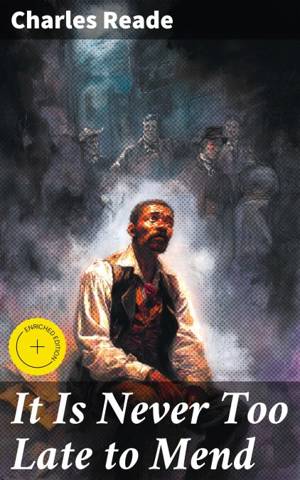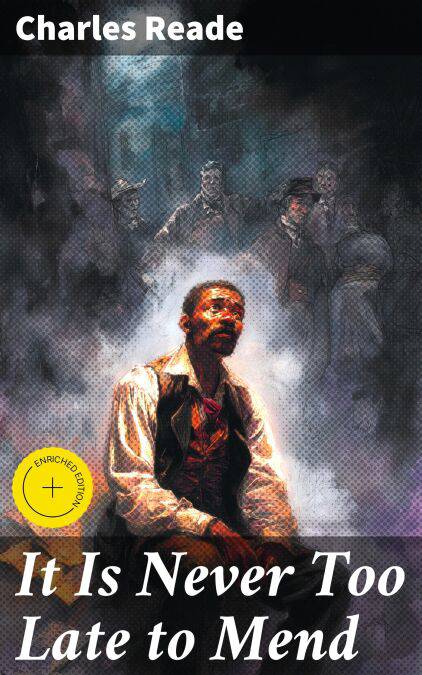
- Afhalen na 1 uur in een winkel met voorraad
- Gratis thuislevering in België vanaf € 30
- Ruim aanbod met 7 miljoen producten
- Afhalen na 1 uur in een winkel met voorraad
- Gratis thuislevering in België vanaf € 30
- Ruim aanbod met 7 miljoen producten
Zoeken
It Is Never Too Late to Mend E-BOOK
Enriched edition. A Tale of Redemption and Justice in Victorian England
Charles Reade
E-book | Engels
€ 1,99
+ 1 punten
Uitvoering
Omschrijving
In "It Is Never Too Late to Mend," Charles Reade weaves a compelling narrative that delves into themes of justice, redemption, and societal reform. Set against the backdrop of the Victorian era, the novel employs a realist literary style, rich with vivid characterizations and intricate plot lines. Through the experiences of its protagonist, a wrongfully imprisoned man, Reade examines the failings of the penal system, shedding light on issues of morality and social responsibility. The interplay between personal and societal crises reflects the broader context of 19th-century England, where calls for reform were burgeoning, offering readers both a gripping story and a pointed social commentary. Charles Reade, an influential figure in Victorian literature, was known for his advocacy for social change, often inspired by the injustices he witnessed in his own life. His background as a medical student and his extensive travels provided him with a unique perspective on the human condition and the systemic flaws within institutions. These experiences fueled his passion for reform, ultimately culminating in the creation of "It Is Never Too Late to Mend." Reade's commitment to unveiling the truth through literature thus becomes a cornerstone of his narrative. This novel is recommended for readers interested in social justice, Victorian literature, or character-driven stories that engage with moral dilemmas. Reade's nuanced portrayal of redemption, paired with his keen observations of society, makes this work a significant and thought-provoking read. It encourages us, even in contemporary times, to reflect on our own roles in the systems around us and reminds us that change is always a possibility.
In this enriched edition, we have carefully created added value for your reading experience:
- A succinct Introduction situates the work's timeless appeal and themes.
- The Synopsis outlines the central plot, highlighting key developments without spoiling critical twists.
- A detailed Historical Context immerses you in the era's events and influences that shaped the writing.
- A thorough Analysis dissects symbols, motifs, and character arcs to unearth underlying meanings.
- Reflection questions prompt you to engage personally with the work's messages, connecting them to modern life.
- Hand‐picked Memorable Quotes shine a spotlight on moments of literary brilliance.
- Interactive footnotes clarify unusual references, historical allusions, and archaic phrases for an effortless, more informed read.
In this enriched edition, we have carefully created added value for your reading experience:
- A succinct Introduction situates the work's timeless appeal and themes.
- The Synopsis outlines the central plot, highlighting key developments without spoiling critical twists.
- A detailed Historical Context immerses you in the era's events and influences that shaped the writing.
- A thorough Analysis dissects symbols, motifs, and character arcs to unearth underlying meanings.
- Reflection questions prompt you to engage personally with the work's messages, connecting them to modern life.
- Hand‐picked Memorable Quotes shine a spotlight on moments of literary brilliance.
- Interactive footnotes clarify unusual references, historical allusions, and archaic phrases for an effortless, more informed read.
Specificaties
Betrokkenen
- Auteur(s):
- Uitgeverij:
Inhoud
- Aantal bladzijden:
- 617
- Taal:
- Engels
Eigenschappen
- Productcode (EAN):
- 4057664591944
- Verschijningsdatum:
- 18/05/2021
- Uitvoering:
- E-book
- Beveiligd met:
- Digital watermarking
- Formaat:
- ePub

Alleen bij Standaard Boekhandel
+ 1 punten op je klantenkaart van Standaard Boekhandel
Beoordelingen
We publiceren alleen reviews die voldoen aan de voorwaarden voor reviews. Bekijk onze voorwaarden voor reviews.








